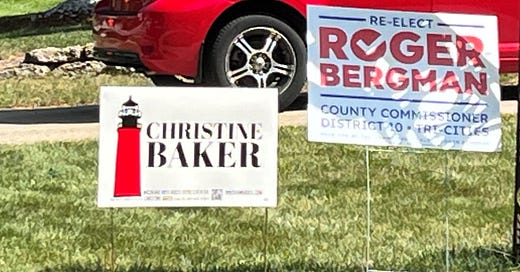It’s a question that’s been asked a million times over and you see it time and again in recorded public comments: an upset citizen yells into the microphone, “you serve me, you represent ME.”
But do they? It’s a philosophical question at a minimum.
The answer to the question will be different from each candidate or elected official.
The answer may depend on:
What caused them to run?
Who voted for them/what is their political affiliation?
Who funded their campaign?
Are they principled or instead desire affirmation?
It’s a rare candidate that would set their beliefs and convictions aside to serve “ALL” people.
As re-branded Marxism via common-sense destroying social ideas like Critical Race Theory, Intersectionality and Queer Theory strategically works its way into local government, public education and corporations, the effort to serve “ALL” people becomes increasingly challenging. Many of our leaders are moving the nation toward globalism and decision-making for the common good (socialism), leaving those who believe in the foundation of America (the ideas that individual rights come from God not government, that free-market capitalism produces prosperity, everyone has equal opportunity, and Judeo-Christian values are our bedrock) to be painted as nationalists and racist.
Unfortunately, it rarely seems that our leaders have a strong understanding of the U.S. Constitution, the Michigan Constitution or the policies which govern the office for which they are running.
Some would argue that the candidate or elected official is only required to represent the values of those who voted for them, especially if they want to be elected again. Parties have platform values, “a brand”, that members and voters can supposedly rally around. How can any person be expected to represent ALL voters? It’s impossible and undermines the purpose of party politics and campaign funding.
The primaries are important elections because the voter can endorse the candidate that best represents their values. Typically, registered voters of a party compliantly vote for those candidates who “check the box” indicating they will represent that party. But the truth is that political parties generally do not vet candidates. They let the voters decide at the Primaries.
Several current Republican Commissioners have encouraged Democrats to vote in the Republican primaries and have been endorsed by the progressive organizations Ottawa Integrity, and Vote Common Good. These commissioners have said: “As longstanding members of the Republican Party, we support the values and policies which have made Ottawa County strong”. But what are those values? What has made Ottawa County strong? As recently as 2018, the commissioners introduced Diversity, Equity and Inclusion, using principles of CRT. Ottawa County has become a member of GARE thereby unwittingly aligning the county with policies common to the burning communities of the Summer of 2020.
Our Commissioners claim they support the values and principles that made Ottawa County strong. It is our historical values that gave Ottawa County its strength and make it the best county in Michigan to live and work. Exactly the same values that DEI seeks to dismantle. Those values are under attack not only by progressives, but by those elected as Republicans to lead our county. They have adopted the progressive intersectionality scale that claims structural racism (discrimination) is built into the foundation of this nation. They claim that those with the most perceived power have created systems that keep those with the least perceived power, in a constant state of oppression. Therefore, EQUITY, not equality, through policy must advance and dismantle perceived power systems.
Locally, Grand Haven school board members have implemented similar initiatives through the creation of the Diversity, Equity, Inclusion and Belonging Committee which plans professional development in hopes of training the ideology to staff and then passing it on to students. GHAPS leaders have partnered with the Momentum Center’s Anti-Racism Task Force to advance this initiative.
At its core, the problem to overcome is understanding the importance of having a grounding in Constitutional principles. How do principles versus a desire for affirmation affect who is represented?
An individual of principle is generally referred to as “principled” often thought to be unwavering in their convictions. Not moving with the winds of change, they are grounded on some sort of foundational values and will not waver as situations fluctuate. Think of ethics (unwavering) versus situational ethics (wavers based on emotional interpretations of facts or situation).
An individual who desires to be liked OVER desiring to stand on principles is not beholden to anyone but self. And no matter how one claims they are “for the people”, an unprincipled candidate will be focused on getting more votes, and manipulating the voters to stay relevant, to stay in power, to stay elected. A principled individual is unwavering in their convictions, being affirmed would be secondary. A recent example would be Patrick Colbeck who ran for Governor in 2018. The loyalty he had from the grassroots was steadfast because he was unwavering in following a moral compass (a list of criteria that must be met in order for a bill or policy to get his vote). Regardless of incredulous, deceitful attacks, he remained true to his principles. So, one candidate is beholden to self and the other is beholden to an unwavering standard. In many cases those standards are unsurprisingly grounded on the idea that objective truth and morality exist as designed by an all-powerful creator. Therefore, that candidate generally answers to God, not the people.
Who do most of the sitting GHAPS school board members and Republican Commissioners serve? You be the judge.


